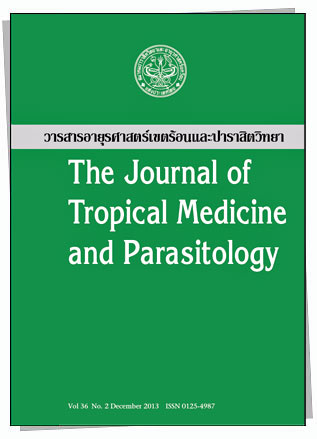Quantitative PCR detection of Toxoplasma gondii in minced pork from selected morning markets in Bangkok, Thailand
Main Article Content
Abstract
Pigs are one of the intermediate hosts of Toxoplasma gondii. The parasite has an asexual development cycle in pigs that results in tissue cysts containing bradyzoites, which remain in the hosts for their entire lifespan, making them a source of infection to new hosts, including humans. Our study investigates whether pigs are a low-risk source of T. gondii infection or if it is under-recognized, by using a real-time PCR assay to examine and quantify T. gondii contamination in 145 minced pork samples obtained from 43 retail meat shops from Thawi Watthana, Phaya Thai, Don Mueang, Nong Chok, and Bang Khun Thian districts of the Bangkok Metropolitan Area. Two of 145 (1.38%) samples were positive and contained 33,100 and 21,900 T. gondii bradyzoites per 100g of minced pork. This high parasite load surpasses that of an infective dose of T. gondii, prompting an urgent need for health education for consumers.

